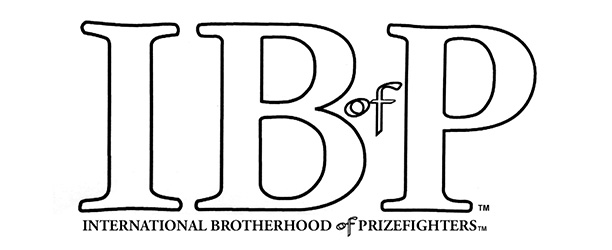Articles of 2003
KENTUCKY: FRIED Part 11 — KERNS IS TOUGHMAN-TRAINED – AND IT SHOWS

The 64th Round
(NOTE: The “Q & A” passages in these reports, as well as the direct quotes, are a product of a deposition taken from Jack Kerns, dated December 10, 2002)
How does one become the chairman of a boxing commission? Surely, there are any number of ways it can happen. Disturbingly, the common thread that would seem to run through all these appointments is – an obvious political connection that takes precedence over all else, and a general disregard for any level of boxing background on the part of an appointee.
Clearly, the mechanics behind this decision-making process needs to be re-examined, especially in the cases of those states where the chairman has more of a “hands-on” involvement in the actual administration of the agency. And Jack Kerns of Kentucky provides a not-so-shining example.
The real reason behind how Kerns actually became a member of the Kentucky Athletic Commission is somewhat shrouded in mystery; however, it can be safely assumed that appointing someone without a high school diploma to a position where he could be the head, titular or otherwise, of a state agency is not an everyday thing, especially when that individual is not a former boxer.
So let's begin our examination of the individual who was responsible for one of the more insidious scandals in recent boxing history, and how he wound up getting as far as he got:
John Charles Kerns was born in the Commonwealth of Kentucky, but while a teenager, moved to live with his sister in Battle Creek, Michigan. Attending Battle Creek High School, he had only finished the eleventh grade when he left school to join the Marine Corps in 1949. Upon his discharge, he worked as a brakeman on the railroad, then as a laborer at a company called Newport Steel. According to his own story, he eventually came to serve as a union representative, although he has been unclear on who he really represented, and spent a total of 13 years at the plant before being laid off – once again for reasons which he neglected to make clear. He went to work selling insurance for a short time, then was, in his own words, a “collector” for a bank. Whether that involved a little “muscle” or not, we don't know.
Most substantially, Kerns was a jailor. Working at the Kenton County Jail in Kentucky for over twenty years, eventually becoming chief deputy jailor, which, one would assume, carries some authority with it.
He retired from the jail in 1989, and subsequently drifted into a number of different occupations. He sold security equipment to some of his old jail contacts for about a year, did some private security work, then worked at a pawn shop near Turfway Park racetrack.
Of course, there are some we have talked to who intimate Kerns did not leave the jail voluntarily at all; rumors persist that there were possible transgressions on his part that precipitated his departure. That was not elaborated on in his deposition, nor have any details been uncovered as of yet by our investigation.
Kerns, in all fairness, at least purports to have some minimal boxing background. He claims three amateur bouts, and testified that he had served as a ringside judge in a few fights, though he was rather nebulous in his deposition as to how many fights he had actually participated in. He was also unclear in making a distinction between which of those assignments were on professional cards and which were amateur cards, and how many of them actually took place inside the state of Kentucky.
He did say that the International Boxing Council (IBC), which would have been under the control of the late Blackie Gennaro, appointed him to do at least one title fight, which would have given him a temporary judge's license in the state of Ohio, which is where the bout took place.
According to Kerns, it was Fred Lampson, the former chairman of the KAC, who initially got him involved with commission activities. It's interesting to note that throughout his deposition, Kerns repeatedly referred to him as “Lampton”.
What's most interesting, though, is where Jack Kerns received the lion's share of his “training” for a job with the Kentucky Athletic Commission. For that, let's go to the deposition:
“Q: So in any event, in the late eighties or early nineties, Fred Lampton asked you to serve as a judge?
A: Uh-huh. Before I even served as a judge, he had asked me – like one time he asked me to come down to Louisville to help him out at a fight, and I went down there, just different things he asked me to do, and then he asked me if I would be a judge.
Q: When you say he asked you to come to Louisville to help him out on a fight, what did he want you to do?
A: Like just go around and check people to see if their bandages were correct and just anything in general that had to do with getting fights going.
Q: When you were asked to be a judge at a fight, where was that? What was the first time you served as a —
A: The first one was in Richmond, Kentucky at the National Guard Armory.
Q: Was that a professional fight?
A: Yes, sir.
Q: And was that under the auspices of the Kentucky Athletic Commission?
A: Yes, sir.
Q: Before serving as a judge, did you have to undergo any training or certification?
A: They worked me on like Tough Man and things like this. You know, Tough Man, they don't keep records. That is not a professional fight, and they'll break judges in like this or give them a chance on that first. If they don't do any good, they're gone. If they show potential, then they'll stay with them and try to help them get on to professional.”
In 1994, Kerns was appointed to the boxing commission by then-Governor Brerenton Jones. But truth be known, he can't really identify HOW he got appointed. He assumes it was through Shirley Hughesman, who was, at the time, the Democratic Party chair for Kenton County. From his testimony, apparently he had lobbied the county's previous Democratic chair, Mike Hammons, but Hammons, evidently a man of uncommon foresight, did not pursue anything on Kerns' behalf.
A year after becoming a KAC member, Kerns was appointed to the chairmanship. And how did that happen? Here is Kerns' response – his level of grammar and elocution undoubtedly justifying such a lofty appointment:
“Different members of the board had went to bat for me and talked to their chairmen and that there and asked that I be appointed.”
It was the administration of current Kentucky governor Paul Patton that placed the supervision of boxing in the state of Kentucky into Jack Kerns' hands.
That turned out to be a very fateful decision indeed.
With his new appointment, Kerns became Kentucky's representative to the Association of Boxing Commissions.
But can he even spell A-B-C?
I don't want to hit you over the head with all of this, but there would appear to be the need for an elaborate illustration here. That is, an illustration of the level of interest, involvement, and understanding of someone who was, at one time, an officer and board member of the Association of Boxing Commissions. It's necessary because this has to be considered a reflection on the group, which represents itself as one that is working in the best interests of boxing, and indeed seeks to establish as much authority as it possibly can toward the ostensible accomplishment of that end.
And for members of the media who may not know any better, it's important to shed light on the kind of people they are ascribing credibility to.
At the ABC's July 2001 convention, which was held in New Orleans, Jack Kerns, in the wake of his tragic mishandling of the Greg Page-Dale Crowe fight – a state of affairs which presumably was known to most ABC members – got himself elected to the position of First Vice-President of the organization, apparently with the support of outgoing ABC president Greg Sirb, who has since been campaigning for the job of federal boxing “czar”.
At the very least, according to the transcript of the convention, Sirb did not voice an objection to the election of Kerns, despite the fact that he had expressed full awareness of Kerns' activities on an Easter Sunday edition of ESPN's “Outside the Lines” that explored the Page situation. Sirb himself was busy trying to gather support for his own election to the newly-created position of “Past President”, which would allow him to continue holding a seat on the ABC board (for possible motivations that were detailed in the first “Operation Cleanup” book), and was in no position to be throwing away potential reciprocal votes.
Kerns won his election by just one vote – meaning it was Sirb's vote that could have actually made the difference – and it can be argued with a considerable degree of conviction that the presence of Kerns stripped away any plausible perception of credibility from the ABC.
But since he has refused to talk to the media since the Page tragedy, not until his actual testimony in the deposition does he reveal, for public consumption, (a) his true understanding of what his duties were at the ABC, (b) what, if any, participation he had in shaping ABC policy, (c) what, to his knowledge, was the basic function and purpose of the ABC.
For that reason, it is indeed very fortuitous that we can reference these legal documents.
The initial intention of Greg Page's attorney, Doug Morris, was to focus in on what approach the ABC, in their so-called “training” sessions, took toward the general safety of fighters, and whether those standards set an example that Kerns followed in the disposition of his own job in Kentucky.
“Q: Did any of those sessions involve safety issues related to fights?
A: You know, it's always our job to keep the boxers safe, if humanly possible, but it wasn't up to a judge. The judge could just judge what he seen.
Q: Yes, sir. I'm just asking if any of these seminars that – where these referees or judges came in, did any of those deal with any safety issues?
A: No, sir, just judgment calls where you had to make a decision right there. You know, who you think done this or whatever.”
Kerns didn't get much training in this area from outside the ABC either:
“Q: Have you ever had at anytime any training related to safety matters connected with professional boxing?
A: No training, no, sir.
Q: How about amateur boxing? Have you ever undergone any training related to safety issues associated with amateur boxing?
A: No, sir.
Q: Is there anyone that's a member of the Kentucky Athletic Commission that's designated to have any particular responsibility for safety issues related to fights sanctioned by the Kentucky Athletic Commission?
A: I think that all the commissioners are when we have – if we have a bout, if there's anything that comes up and we've got to make a judgment call, the commissioners there would do that anytime there's a judgment call.
Q: So all the commissioners are equally responsible for seeing to it that the fights are carried off in a safe manner?
A: Whoever I would appoint would be there and we would work together. Yes, sir, they're responsible, too.”
And speaking of being 'responsible':
“Q: What are the responsibilities of the vice president of the ABC?
A: Anything that the president would ask you to do, you would try to do.
Q: Who is the president?
A: Tim Luckenheimer.
Q: Can you spell that last name for me?
A: I can't spell it.”
He can't say it either. I'll be perfectly honest with you – I don't know anyone by the name of “Tim Luckenheimer”. I DO know that a gentleman named Tim LUCKENHOFF is the president of the Association of Boxing Commissions.
“Q: What is the function of the ABC?
A: Well, they're trying to get all the states to work together, like unified rules. They want everyone to fight – like some states have three knockdown rules, they want it so they'll have no knockdown rules. They want all the rules to be the same.
Q: Have they accomplished that?
A: I would say they're doing pretty good. There might be some things that they want to do that they haven't got yet, but I couldn't really tell you what all their goals are.”
Next, Morris explored the positive effects of Kerns' involvement, what he took from the ABC, and what he did to improve the rules in his own state or did to bring themselves into line with what was recommended as part of the “unified rules” of the ABC.
“Q: Has Kentucky changed any of its rules because of the ABC?
A: On the unified rules on a championship fight.
Q: They have?
A: Yes.
Q: When did they do that?
A: Now, you know, I say they have. They talked about it at the commission meeting, but whether it's really become law yet, I can't say that yes or no. But they have talked about it at the meetings and that's the way they want it to be done.
Q: So as a Kentucky athletic commissioner, you don't know if the boxing commission of the state of Kentucky has adopted the unified championship rules or not?
A: No. We've talked about different rules we want to change, but I don't think they went from the – what is it? The LRC or whatever it is.
Q: So they have not been adopted by the state of Kentucky?
A: Not to my knowledge.”
Of course, Kerns knew what the REAL important stuff was.
“Q: In terms of presenting any rules changes to the Kentucky legislature, have you personally been involved in doing any of that?
A: Yeah. Yeah. We got some of them changed. We got – well, I say we – they got them changed. Like raising the salary for the judges and referees and things like that, that was changed, because they have to send it all the way down to Kentucky.
Q: When was that changed?
A: About two years ago.
Q: And what was your role in getting that done?
A: Just they called me in front of the senate, and you know, they had a committee, and they asked me questions, you know.
Q: Have you ever been involved in seeking any other rules changes other than increasing the salaries for judges and referees?
A: We've turned in different – we talked about it at the meeting about, you know, things we would like to be changed, but nothing has actually been done yet.”
Kerns said that a condition for judges and referees to be licensed was to take a test and attend a seminar once a year.
“Q: Who conducted the seminars?
A: One of the commissioners – I had a fellow named Emmett Igo, he was one of them. I helped out. And we would bring such people in as Greg Sirp. He's the chairman for the state of Pennsylvania.
Q: What's his last name?
A: Sirp.
Q: S-e-r-p?
A: S-i-r-p.”
I have no knowledge of a commissioner from Pennsylvania whose last name rhymes with “burp”, though I readily admit, when I think of regulation in the Keystone State, I do occasionally belch.
To continue…………..
“Q: Did any of those seminars deal with any safety issues?
A: Keep in mind that every time we had any kind of school or anything that was our first thought was safety for the fighters.
Q: So what did you do in these seminars from '95 until 2001 to address that first thought of safety? What courses, what materials did you cover?
A: Well, we didn't have any courses, but we would tell the referees, you know, you've got to watch, and you feel – if you think that a person is in danger, you stop that fight and let him fight another day.”
Unfortunately, Greg Page won't have that luxury.
fightpage@totalaction.com
Copyright 2003 Total Action Inc.
Articles of 2003
The War at 154

They're calling it the “War at 154,” though no one will confuse it with plucking evil dictators out of dirty rat holes or patrolling the rubble and dark streets of a dying city.
Still, they're hoping this fight somehow lives up to its top billing, praying a slugfest breaks out instead of 12 rounds of elevator music.
IBF champ Winky Wright (46-3, 25 K0s), versus WBA and WBC champ Shane Mosley (39-2, 35 K0s) for the undisputed junior-middleweight (or, depending on your mood, super-welterweight) championship of the world.
Finally.
It has a nice, long-overdue ring to it, a kind of “it's about damn time,” feel to it.
If you want to give credit to the right people for getting this fight done, you can start with Cory Spinks, an unlikely hero now known as the undisputed welterweight champ of the world.
If Spinks hadn't beaten Ricardo Mayorga on Dec. 13, Wright could have spent January and February snagging some sun on a St. Petersburg beach. That's because Mayorga was expected to walk through Spinks on his way to a lucrative fight with Mosley in March.
But somehow, Spinks found a way to beat Mayorga and suddenly, Mosley no longer had a March opponent and everything appeared to be ruined. Plans were shattered, promises broken, money was lost. The wife cried, the dog howled and the kids were sent to bed early.
How can this happen?
Then an idea occurred to someone important.
Hey, what about Ronald “Winky” Wright? I don't think he's got any big plans for March.
Winky, who was free in March, owes Cory a friendly slap on the back.
So what does the March 13 fight between Mosley and Wright (on HBO) at the Mandalay Bay Resort and Casino in Las Vegas mean?
Just about everything if you weigh 154 and hold a world title belt.
It means Winky finally gets the big-money, big-name fight that could define his career, the fight he's been chasing since his controversial majority-decision loss to Fernando Vargas in 1999.
It means Gary Shaw, Mosley's promoter, also deserves a little pat on the back for somehow putting this fight together.
It means for the first time in 29 years, you'll only have to know one name when the bar talk turns to who the best junior-middleweight fighter in the world is.
It means Mosley better arrive at the gym early and leave late. He's not fighting the awkward banger he'd be facing in Mayorga. While Mayorga knows how to slug, Wright knows how to box.
It means Wright doesn't have to pack his passport the day he leaves for the fight. He won't have to hire an interpreter, change his currency, drive on the left side or learn how to eat and pronounce strange food. Of Wright's 49 fights, 20 have required extra paperwork and extra-long plane rides. He's fought in eight different countries and on four different continents.
No wonder no one over here knows who Winky Wright is.
Finally, this fight means that with the right money and for the right reasons, two guys in the same weight class holding different world titles, can come to an understanding that meeting inside the ring to decide who is the real champion makes all the sense in the world.
The sad thing is, it took an upset by another fighter in a different weight class – Spinks – to finally make it happen.
Articles of 2003
KILL THE BILL Volume 7 — ANOTHER REFORMER WHO NEEDS TO BE REFORMED

The 99th Round
Earlier this month, in response to what he, and others, considered an excessive amount of “pork” in the latest energy bill, John McCain told his Senate colleagues, “The outbreak of Washington trichinosis will be so severe, we will be forced to have a field office for the Centers for Disease Control right next to the Capitol.”
In a recent Associated Press wire story, McCain was described as “an avid critic of spending for lawmakers' pet projects.”
One of the great curiosities of McCain's campaign to slip through Congress his own pet project, the expensive ($36 million over five years), ineffectual, and perhaps unconstitutional Professional Boxing Amendments Act (to federalize control of boxing) has been his outright refusal to include television entities – by far the most powerful and influential forces in the sport – among those which would fall under regulatory jurisdiction.
Critics have cried foul – and they've had a point. If networks are going to control the balance of power, define the major 'players', put fighters under contract, and in some cases actually assume the 'de facto' role of a promoter, they are receiving unequal and unfair protection vis-a-vis the promoters in boxing who are actually required to be licensed and regulated.
However, McCain has been resolute about maintaining this protection, avoiding all opportunities to adjust or amend the bill to accommodate the reality of the industry, not to mention Senator Harry Reid of Nevada, who had previously introduced legislation that would provide some oversight of networks when they play a promotional role. McCain has been nothing short of combative on occasion, “calling out” Reid in press conferences, and in correspondence he has leaked to the public.
Why is McCain so stubborn? Part of the reason lies in a mode of political operation that has become imbedded in the man itself, despite countless “spins” to the contrary.
What is common knowledge inside the Beltway, but not necessarily among average boxing fans, is that while McCain has carefully crafted an image as a reformer railing against special interests, he has developed a talent that is much more acute, as one of the very best in the business at feeding from the corporate trough.
He has been slick enough to parlay his coziness with corporate interests into political capital, resulting in lots of money coming his way for campaigns. And his public relations apparatus, which has included many highly-cooperative writers, both in and out of sports, has enabled him to avoid having to discuss the considerable influence special interest groups have had on the drafting and development of McCain's boxing bill – the same types of groups he would purport to be thwarting in the Bipartisan Campaign Finance Reform Act (otherwise known as McCain-Feingold), which, at the end of the day, amounts to little more than a rather brazen attempt to protect his own incumbency and that of other elected officials.
Campaign finance records available through the website OpenSecrets.org indicate that, for example, during 1999, the third-highest contributor to what, at the time, was McCain's insurgent run at the Republican presidential nomination was Viacom ($47,750), which controls a number of TV outlets, including Showtime, which has a major investment in boxing.
The top eight corporate contributors to McCain's “Straight Talk America” political action committee from 1997-2002 included three companies that would be affected, one way or another, by the way McCain's bill was shaped – Viacom, AT&T (which controlled cable outlets and sold pay-per-view boxing events), and AOL Time Warner (which owns HBO, boxing's most powerful single entity).
And as for McCain's last U.S. Senate campaign, waged in 1998, the list of his top fifty corporate donors is replete with entities who have a substantial stake in boxing, and which have a “special interest” in avoiding the regulatory blanket – Viacom (3rd – $55,250), AT&T (4th – $51,563), NBC/General Electric (20th – $19,500), Fox/News Corp. (22nd – $19,050), Time Warner (T43rd – $12,000), and Univision (T43rd – $12,000), not to mention Anheuser-Busch (5th -$51,563), a company in which McCain has considerable financial interests, both individually (he has reported at least a half-million dollars in debentures) and through his family (which controls the largest distributorship in Arizona), and which over the past two decades has been boxing most prominent sponsor, with nearly all of that advertising delivered through television.
The Senate Committee on Commerce, Science and Transportation, which McCain chairs and under whose domain the boxing bill falls, is heavily courted by companies with interests in the sport. For the six-year cycle between 1995-2000, the top committee-related contributors to committee members include: AT&T ($369,960), Time-Warner ($249,585), Viacom ($167,654), the Walt Disney Company, which owns ESPN ($147,758), and the National Cable Television Association ($129,101).
Noted boxing promoters like Don King, Bob Arum, Cedric Kushner, Main Events, Duva Boxing, Gary Shaw or DiBella Entertainment do not appear on that list; apparently there was not enough in the way of donations to rise in McCain's pecking order.
Despite his well-cultivated “reformer” image, McCain has time and again demonstrated that he is a creature of corporate America and a bedfellow of corporate lobbyists. His leveraging efforts have been particularly remarkable, and he's utilized his position on the Commerce, Science and Transportation Committee – first as the ranking Republican and now as chair – to extract hundreds of thousands of dollars from corporations he has regulatory power over.
McCain, who through his campaign finance measure is regarded by many First Amendment advocates as no friend of free speech, is notorious for freezing out consumer groups who would like to present their cases to his committee but who have not lavished him with campaign donations. According to a February 2000 story in the New York Press, representatives of corporations – the lion's share of which are directly tied to McCain's campaign war chests – out-number such consumer-interest groups by a 10-to-1 margin when it comes to appearances at committee hearings.
The causative links between campaign donations and special favors have become a McCain trademark. In 1999, after McCain-authored legislation to allow satellite TV companies to carry local programming in each market, which had previously been prohibited, was approved by his committee, one of the players who stood to experience a resulting windfall – EchoStar Communications – held a huge fund-raiser for McCain's presidential campaign.
During the 2000 primary season, as word came down that McCain was pressuring the Federal Communications Commission to act on a license transfer in favor of Paxson Communications, a company that had, to that date, “coordinated” $20,000 in contributions for his run at the nomination and treated him to many free flights on its corporate jet, his then-opponent, George W. Bush, was moved to remark, “I think somebody who makes campaign financing an issue has got to be consistent and walk the walk.”
Of course, one understands McCain's pattern of behavior more vividly upon an examination into his central role in the infamous “Keating Five” scandal, one of history's most naked examples of politicians exerting special levels of influence for the sake of large campaign contributors.
Charles Keating Jr., who owned the Lincoln Savings & Loan Association and was a major presence in Arizona, was under investigation by authorities – specifically the Federal Home Loan Bank Board – for making investments of such a speculative nature that they put at risk the government-insured money of depositors. Keating took issue with the premise of the investigation, and wanted the regulators off his back. He had, between 1982 and 1987, stuffed the campaign coffers of five United States Senators – John Glenn of Ohio, Dennis DeConcini of Arizona, Alan Cranston of California, Don Riegle of Michigan, and McCain – to the tune of $1.4 million.
At the same time, McCain family members, including his wife and father-in-law, were the chief investors in the Fountain Square Shopping Center, controlled and managed by Keating, with a stake estimated at $359,000. McCain and his family were also frequent vacation guests of Keating – traveling at Keating's expense on Keating's private jet to the resort Keating owned at Cat Cay in the Bahamas – at least nine times in all. Surely there were interests to protect on more than one front.
Although he later claimed to be very reluctant in doing so, McCain nonetheless couldn't resist in joining with his four Senate colleagues in April of 1987 to pressure regulators to end their investigation of Keating, which had been ongoing for two years. The regulators later testified that they felt intimidated by McCain's group, which was tagged the “Keating Five”.
To illustrate the justification of the investigation, the S&L controlled by McCain's friend Keating busted out, ruining thousands of investors and costing taxpayers $3.4 billion in bailouts, the worst hit in the entire saving and loan scandal.
There was also more than one call within his home state of Arizona for McCain to resign.
During this particular period in his career, McCain was hardly interested in raising the issue of campaign finance reform. In fact, quite the contrary – he resisted it at every turn and resisted others who made an effort in that direction. According to a December 8, 1987 story in the Phoenix Gazette
, “So why has Sen. McCain, R-Ariz., gone to unprecedented lengths to block reform of the Senate campaign finance system? Why does he oppose letting this important matter even come to a vote? Perhaps it's because he is a prime beneficiary of the special interest funding of congressional elections. McCain raised over $2.5 million for his 1986 election . . . more than $760,000 of his campaign funds came from political action committee (PACs) . . . especially disturbing are the contributions to McCain's campaign coffers from PACs outside of Arizona.”
And McCain simply embarrassed himself when his family's investment deals with Keating were uncovered. In September of 1989, as he was questioned about them by the Arizona Republic, he called the reporter “a liar” and denounced his efforts as “irresponsible journalism”. When pressed later, he told the same reporter, “That's the spouse's involvement, you idiot.”
In ultimately protecting one of their own, the Senate Select Committee on Ethics asserted McCain broke no laws, but did say this about the man who is now the self-professed “champion of campaign finance reform”:
“Mr. Keating, his associates, and his friends contributed $56,000 for Senator McCain's two House races in 1982 and 1984, and $54,000 for his 1986 Senate race. Mr. Keating also provided his corporate plane and/or arranged for payment for the use of commercial or private aircraft on several occasions for travel by Senator McCain and his family, for which Senator McCain ultimately provided reimbursement when called upon to do so. Mr. Keating also allowed Senator McCain and his family to vacation with Mr. Keating and his family, at a home provided by Mr. Keating in the Bahamas, in each of the calendar years 1983 through 1986……..”
According to a Time magazine story in December of 1999, ” He (McCain) denounces big-spending special interests and yet accepts flights on corporate jets; he puts the speaker of the Arizona house of representatives on his campaign payroll despite a flurry of ethics charges around him; he neglects to recuse himself from debates about measures that would affect his family beer business.”
Yet the writers, Nancy Gibbs and John F. Dickerson, insist, “But a funny thing happened on the way to his deathbed conversion (to campaign reformer): he really reformed.”
McCain's posture toward television interests in the process of crafting the boxing bill would strongly suggest otherwise.
On a personal note, as I reviewed some of the material for this story, my mind regressed to a couple of years ago, as I was compiling the investigative report “A Commission Run Amok”, which dealt with the Florida State Athletic Commission.
At the time, Mike Scionti, the commission's former executive director, was awaiting a hearing on ethics charges. He had been embroiled in a firestorm of controversy that eventually led to his firing by Governor Jeb Bush, over what was considered to be highly improper conduct while in office. A non-profit organization – a charity for youth – that the commission had established and Scionti had spearheaded, accepted a large donation from promoter Don King, after which Scionti had sought to change a commission regulation about promotional contracts that would have benefited King.
There was no evidence that any money went into Scionti's pocket directly, or that it went to furthering any personal agenda of Scionti's – public relations-related or otherwise.
Meanwhile, McCain had gone to bat, more aggressively and, by all accounts, with a much heavier hand, on behalf of entities that plowed money into his election campaigns and to political action committees that were designed to promote McCain's political objectives – in many respects creating a higher public profile for the senator, which has in turn spawned media coverage, book sales, and even more political donations.
And I'm saying to myself, isn't what McCain has done more devoid of an ethical foundation than what Scionti did? And are there not 500 others engaged in the same ballgame as McCain – albeit not as skillfully – on Capitol Hill?
The stories you hear about boxing people pale by comparison. If state boxing regulators conducted business in the same manner as McCain has conducted his business in Congress, would I not have been able to write about twenty “Operation Cleanup” books by now?
And given those parameters, at what price would we be placing the sport into the hands of politicians like him?
As one writer put it, “The John McCain of old should be thankful that his political fate wasn't determined by John McCain the reformer.”
I would suggest McCain's nothing more than an old dog who could care less about learning new tricks.
fightpage@totalaction.com
Copyright 2003 Total Action Inc.
Articles of 2003
The Highs and Lows.

In a few days we'll be turning the page on 2003 and looking ahead to another year that is bound to be eventful- they almost always are.
But before we go full speed ahead to 2004, let's look back on what we've witnessed the past 12 months in the game of boxing.
And what we've found out is that sometimes the sports highlights, were also it's lowlights. Oftentimes, they were one in the same.
HIGHLIGHT: Vitali Klitschko's valiant performance against Lennox Lewis.
Coming in as a late replacement for Kirk Johnson, Klitschko would give the heavyweight champion all he could handle for six rounds before the fight was halted because of a grotesque cut over his left eye. In fighting so well and bravely against Lewis, he not only changed the perception of himself, but off his whole fighting family. The Klitschko name had been redeemed.
LOWLIGHT: Lennox Lewis's behavior with HBO's Larry Merchant after that fight.
Lewis has been a very respectable and representative champion during his reign. But he acted like a downright brat in his post-fight interview with Larry Merchant on live television. When confronted with the truth, he tried to hijack the interview by yanking the microphone away from Merchant, who had to hold on for dear life. During the bout he looked like a fading fighter on a bad night. Afterwords, he looked like an infant in need of a timeout.
HIGHLIGHT: Arturo Gatti and Micky Ward complete their thrilling trilogy.
Gatti and Ward had a lot to live up to when they met for the third time this past June. And live up to it they did, in a fight with momentum shifts and a constantly changing ebb-and-flow. Gatti would overcome a damaged right hand to win a hard-fought ten round decision. It was a fitting conclusion to one of the games great rivalries and the career of Ward, who called it a day on a proud career.
LOWLIGHT: There will be no more Gatti-Ward in the future.
Which may actually be a good thing, because I'm not sure they could handle anymore of each other. But boxing will miss this rivalry.
HIGHLIGHT: Oscar De La Hoya and Shane Mosley rematch.
It's always good for the business of boxing when 'the Golden Boy' engages in a mega-fight. The interest is high- even among the usually apathetic general media- boxing becomes the showcase event in the world of sports and everyone involved: from the fighters, to the promoters, the pay-per-view outlets and casino's make money.
LOWLIGHT: De La Hoya's and Arum's reaction to the decision in that fight.
It's one thing to think that you won a close fight, it's even acceptable to complain about the decision. But the manner in which both Oscar and his promoter cast aspersions on the judges and Nevada State Athletic Commission, were low blows of the Andrew Golota variety. Luckily for them, they were only given light slaps on the wrists for their irresponsible and incendiary comments.
But the bottom line is they both hurt the sport with their allegations and the fact that more than one media outlet ran with their quotes, further hurt boxing's reputation.
HIGHLIGHT: Roy Jones makes history
In defeating John Ruiz for the WBA heavyweight belt, Jones became the first middleweight in over a hundred years to win a heavyweight crown. This fight also did very well, registering over 500,000 pay-per-view buys, which is always a good sign for the industry.
LOWLIGHT: Jones' indecisiveness after that win.
Jones had all the momentum in the world after his win over Ruiz, but instead of capitalizing on it, he tried to pinch pennies with Evander Holyfield, threw out astronomical numbers for a fight with Mike Tyson( which is a loooong ways from ever happening) and then had to settle for a rather non-descript fight back at light heavyweight against Antonio Tarver.
HIGHLIGHT- Toney turns the 'Lights Out' on Holyfield
James Toney had seemingly been in exile since his embarrassing loss to Roy Jones in 1994. But he came back strong in 2003 with wins over Vassiliy Jirov and then a stoppage of Evander Holyfield, which stamped his entrance into the heavyweight division. The game can always use a few good big men and who cares if that comes in the form of former middleweights like Toney and Jones.
LOWLIGHTS: Holyfield isn't retiring.
'The Real Deal' maintained that he wouldn't retire till he won the undisputed title or got his hat handed to him. Well, after this bout it was evident that the former wasn't happening and the latter did. But like most other great fighters, they are the last to know when it's time to call it a day.
HIGHLIGHT: 'Pac Man' gobbles up Barrera.
It's always shocking and uplifting when a fighter bursts onto the scene and elevates himself the way Manny Pacquiao did against Marco Antonio Barrera this past November. Barrera, had universal acclaim as one of the sports premiere pound-for-pound performers. Pacquiao, while a respected fighter, was thought to be just a notable opponent for Barrera.
Instead, Barrera would get blitzed by the all-out, frenetic attack of the Filipino. Barrera would be simply overwhelmed by the punches of Pacquiao and his corner would have to rescue him from the onslaught of the southpaw in the eleventh round.
LOWLIGHT: Murad Muhammad allegedly gobbles up Pacquiao.
This was mentioned prominently on the HBO broadcast that out of the $700,000 license fee given to Pacquiao's promoter, Murad Muhammad, only about $300,000 had gone to the fighter. And that was before the money was cut up in various ways.
Once source close to the situation tells me that after all was said and done, Pacquiao, wound up with about $80,000. It looks like he may have taken a worse beating than the one he gave out.
HIGHLIGHT: Johnny Tapia comes out of a coma in January.
You gotta hand it to Tapia, most guys take standing eight counts, this little guy takes mandatory flat lines, this is about the third or fourth time he's been close to dead only to come off the canvas. Once again after another relapse in drugs, he would be in an intensive care unit battling for his life. As friends, family and loved ones surrounded him, he would beat the odds once again to walk out of the hospital and fight again.
LOWLIGHTS: Tapia reportedly overdoses in December.
Tapia swears that he did not overdose, but rather took some cold medication that he had an allergic reaction to. Uh, ok, sure, whatever you guys say. But do they have to insult everyone's intelligence, here? Isn't it time that Tapia got some real help for his problems?
-
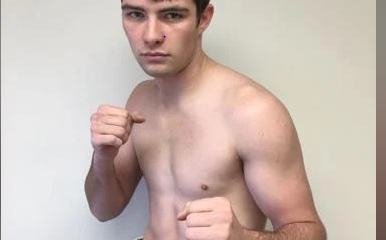
 Featured Articles5 days ago
Featured Articles5 days agoIn a Massive Upset, Dakota Linger TKOs Kurt Scoby on a Friday Night in Atlanta
-
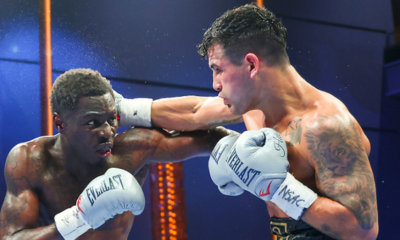
 Featured Articles3 weeks ago
Featured Articles3 weeks agoHitchins Controversially Upends Lemos on a Matchroom Card at the Fontainebleau
-
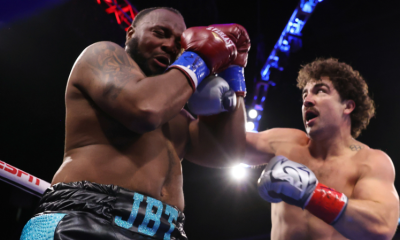
 Featured Articles4 weeks ago
Featured Articles4 weeks agoUndercard Results from Arizona where Richard Torrez Jr Scored Another Fast KO
-

 Featured Articles4 weeks ago
Featured Articles4 weeks agoZurdo Ramirez Accomplishes Another First; Unseats Cruiser Titlist Goulamirian
-
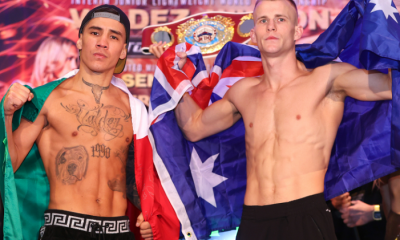
 Featured Articles4 weeks ago
Featured Articles4 weeks agoAvila Perspective, Chap. 278: Clashes of Spring in Phoenix, Las Vegas, and LA
-

 Featured Articles3 weeks ago
Featured Articles3 weeks agoAvila Perspective, Chap. 280: Oscar Valdez, One of Boxing’s Good Guys, and More
-
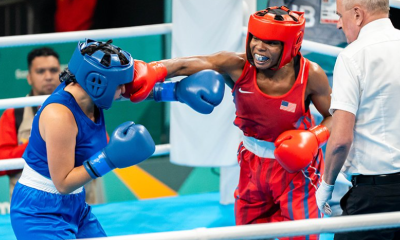
 Featured Articles3 weeks ago
Featured Articles3 weeks agoThe Hauser Report: Literary Notes and More
-

 Featured Articles3 weeks ago
Featured Articles3 weeks agoThe Sky is the Limit for Globetrotting Aussie Featherweight Skye Nicolson

